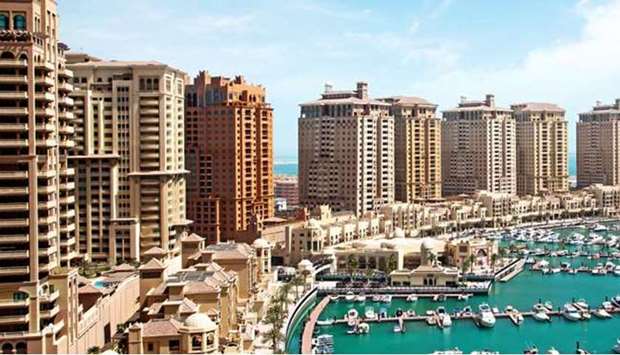The decline in rental for residential developments was relatively softer compared to other core asset categories such as commercial office and retail, KPMG said in a report
Qatar's real estate market continues to “face a period of contraction”, a KPMG report said and noted the decline in rental for residential developments was relatively softer compared to other core asset categories such as commercial office and retail.
Research showed the drop in rental for residential developments, which was still lower than other core asset categories, including commercial office and organised retail mall.
Rentals in the affordable housing category continue to stay afloat while maintaining stable occupancy levels. The middle-income housing segment continues to experience active demand primarily due to movement of tenants seeking better value proposition, which includes locational advantages, superior offering at competitive rental due to added incentives such as rent-free periods of one to two months, free utility bills and better services as well as upliftment in amenities, KPMG said.
While the drop in the rentals for the high-end housing segment has been primarily due to competitive landscape, there has been increase in inquiries especially for the developments at The Pearl and Lusail. Overall, Q3 and Q4 2020 witnessed a combined drop of 3.63% on the residential rental index compared to 2.53% as witnessed during Q1 and Q2 2020.
For the commercial office market, the impact of Covid-19 was comparatively higher than residential segment. Q3 and Q4 2020 witnessed a cumulative decline of 7.63% on the rental index compared to 1.56% experienced during the initial two quarters of 2020.
On the organised retail mall front, the Covid-19 pandemic led to a significant decline in rentals. The rental index experienced a further drop of 8.77% over the last two quarters of 2020 from 2.36% as witnessed during Q1 and Q2 2020.
Anurag Gupta, director and head (Strategy and Real Estate Advisory) at KPMG in Qatar said, “The real estate market continues to face a period of contraction in both volume and price. Following the large drop in the quarterly rentals due to the pandemic, real estate activity exhibited signs of improvement towards the end of 2020.
“We had then anticipated it might approach pre-pandemic levels by H2 2021, but for the recent pandemic situation. With blockade coming to an end and the regional trade activity showing signs of normalisation, Qatar economy is expected to grow rapidly post the pandemic situation.”
Sayantan Pande, associate director and head (Infrastructure, Financing and Real Estate Valuations) at KPMG Qatar said, “Consistent downward pressure on rental yields across core real estate asset classes over past few years is due to growth in supply vis-a-vis demand coupled with impact of pandemic over last four quarters.
“Such consistent downward trend resulted in holistic effort from landlords in augmenting value proposition by bundling product with services. Going forward, it is essential to assess pain points and challenges while designing integrated value-propositions thereby curating a differential offering for all stakeholders.”
Research showed the drop in rental for residential developments, which was still lower than other core asset categories, including commercial office and organised retail mall.
Rentals in the affordable housing category continue to stay afloat while maintaining stable occupancy levels. The middle-income housing segment continues to experience active demand primarily due to movement of tenants seeking better value proposition, which includes locational advantages, superior offering at competitive rental due to added incentives such as rent-free periods of one to two months, free utility bills and better services as well as upliftment in amenities, KPMG said.
While the drop in the rentals for the high-end housing segment has been primarily due to competitive landscape, there has been increase in inquiries especially for the developments at The Pearl and Lusail. Overall, Q3 and Q4 2020 witnessed a combined drop of 3.63% on the residential rental index compared to 2.53% as witnessed during Q1 and Q2 2020.
For the commercial office market, the impact of Covid-19 was comparatively higher than residential segment. Q3 and Q4 2020 witnessed a cumulative decline of 7.63% on the rental index compared to 1.56% experienced during the initial two quarters of 2020.
On the organised retail mall front, the Covid-19 pandemic led to a significant decline in rentals. The rental index experienced a further drop of 8.77% over the last two quarters of 2020 from 2.36% as witnessed during Q1 and Q2 2020.
Anurag Gupta, director and head (Strategy and Real Estate Advisory) at KPMG in Qatar said, “The real estate market continues to face a period of contraction in both volume and price. Following the large drop in the quarterly rentals due to the pandemic, real estate activity exhibited signs of improvement towards the end of 2020.
“We had then anticipated it might approach pre-pandemic levels by H2 2021, but for the recent pandemic situation. With blockade coming to an end and the regional trade activity showing signs of normalisation, Qatar economy is expected to grow rapidly post the pandemic situation.”
Sayantan Pande, associate director and head (Infrastructure, Financing and Real Estate Valuations) at KPMG Qatar said, “Consistent downward pressure on rental yields across core real estate asset classes over past few years is due to growth in supply vis-a-vis demand coupled with impact of pandemic over last four quarters.
“Such consistent downward trend resulted in holistic effort from landlords in augmenting value proposition by bundling product with services. Going forward, it is essential to assess pain points and challenges while designing integrated value-propositions thereby curating a differential offering for all stakeholders.”

